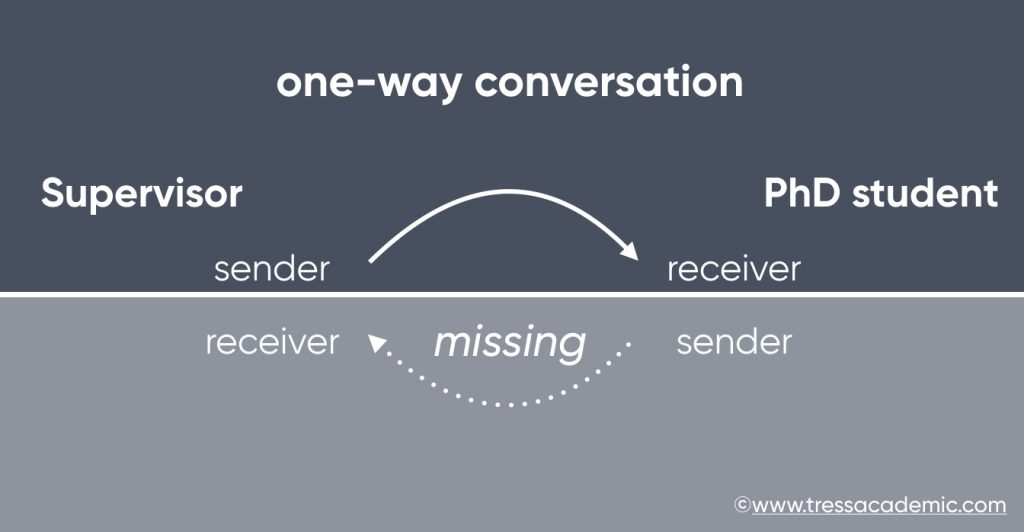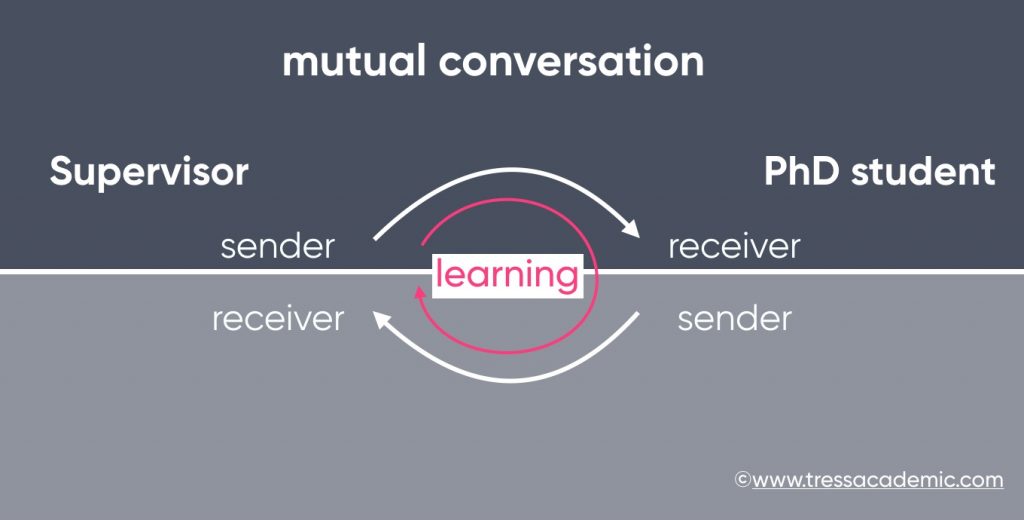Having trouble making yourself heard in conversations with your supervisor? Irritated that you’re not better at getting your message across during meetings? Disappointed afterwards with the advice you got? It doesn’t have to be this way! Check out our 5 tips on how to improve the conversation with your supervisor and make sure to get your points heard!
Do you sometimes feel after supervisory meetings that you had no chance to explain your ideas; that your problems were not solved? And you are angry at yourself that you didn’t speak up more to make yourself heard? Are you left to figure out what your supervisor vaguely suggested or hinted at? In summary: you could not get your message across to your supervisor and a much anticipated meeting ended in vain.
We know that supervisors are different in personality, and so are PhD candidates. With some it is easier to have a constructive discussion than with others. Some might have a rather distanced relationship with you and it might take some courage to speak up and influence the discussion. But no matter what personality-type your supervisor has, with a few professional tricks you can do a lot to improve the conversation during meetings and get your message across.
Have you ever dreamt how it would be if your supervisor understood your problems, thoughts, wishes; saw your point of view; and supported you in your requests. We understand you all too well! And we know that you can’t just turn your back on your supervisor and get everything you want in your PhD – but you can definitely come to the point where you can have a meaningful conversation with them.
We have included a great free worksheet with ‘5 tips to get your message across to your supervisor’, where we lay out simple strategies to make your voice heard. And because we know that you are often searching for the right words, we have even included standard phrases that you can use in the communication! So take a look – all you’ve got to do is add your problems or issues!
1. Experiences with my supervisors
During my studies and my PhD I had my very own experiences with supervisors and that made me realise how important it is to be well-prepared for a meeting and to take action and initiative myself:
For my Masters at Heidelberg University in Germany, I had a highly esteemed professor as my supervisor. And although I knew he appreciated me as a good student, he was always very distanced. He had weekly speaking hours, and if we – as students – wanted a meeting, we had to make appointments beforehand through the secretary. Before the meetings all students would sit in line in the corridor and then we were called in one after the other. I was at least as nervous as before a dental appointment and it actually felt like one. We were adamant to have everything done on our side to not embarrass ourselves and also to make best use of the short time we could speak to him.
My PhD supervisor at Roskilde University was quite the contrary, he was a beacon of goodwill and I could pop into his office whenever I wanted for a question. When we had a scheduled supervisory meeting though I had to watch out. He was not very structured (to say the least) but utterly creative and enjoyed discussing with his students. Without knowing exactly what I wanted from him beforehand, I would come out after a meeting with a bunch of new suggestions and new directions for my PhD project, that were hard to implement and not the most meaningful way forward either.
These experiences told me two things: You’ve got to be well-prepared before meeting your supervisor because time is scarce and you’ve got to let them know exactly what you want from them in order to come away with meaningful advice.
I learned that independent from the type of supervisor you have, with a few hacks and a bit of preparation, you can improve your conversations a great deal. Improving your conversations means more help and better input, better supervision. In the end you’re the one who benefits from that.

2. Experiences being a supervisor
Then, when I started to work as a university lecturer and was regularly supervising myself, I soon discovered what it was like to sit at the other end. I would make an appointment with my students and make sure I would see them regularly. But to my irritation, most of them would turn up cheerfully, plunge on the seat in front of me and wait for my input and what I had to say. It was pretty much the same on my side: I thought they would tell me how I could help them. To avoid any awkward silence, I would then improvise and come up with suggestions for them. I ended up talking a lot instead of letting them talk. But that was not how I envisioned good supervision and I soon found a strategy to have better and more meaningful conversations with my students.
Since then, I have further developed this approach over the years, teaching thousands of PhD students in my course ‘How to complete your PhD successfully’. If you manage to have productive conversations with your supervisor, you can solve many issues on your paths to successful completion more easily. I will share more of my strategies in our upcoming free Webinar – if you want to join, sign up here.
It might be ok to see your supervisor and expect them to ‘tell’ you what to do if you are an undergraduate student, just starting out. But at the stage of a post-graduate research student with the aim to get a PhD degree you can be expected to take matters in your hands and be outspoken about the topics you would like to discuss and where you would like to get advice. I know that this does not come easy to everyone, which is why I have prepared a great free worksheet ‘5 tips to get your message across to your supervisor’. But we didn’t stop with the tips, we’ve included standard formulations that you can use in your supervisory meetings to make your voice heard! All you need to do is to insert your own issues – go grab it!
3. Make it a mutual conversation
Too often a supervisory meeting is a one-sided conversation, see figure 1:
- Supervisor does most of the talking, PhD student is listening.
- Supervisor does explain, Phd student attempts to understand.
- Supervisor makes suggestions, PhD student tries to implement.
But this kind of conversation is missing the point of a good supervisory relationship, which we discussed in the SMART ACADEMICS blog post no. 10: Good PhD supervision – what you can expect.

The conversation between PhD student and supervisor in a supervisory meeting is absolutely crucial. Not only do you exchange important information, but in the mutual discussions and from the feedback you get from your supervisor, you learn and improve (see figure 2). This is where a big part of the knowledge transfer during a research education should take place.

However, if you have a one-sided conversation, where your supervisor dominates and talks all the time, this learning-effect can’t take place. As a result, you constantly feel overrun, not-listened to, and forced to take up and implement the ideas and suggestions of your supervisor. It does not have to be this way, you can make your voice heard, but you need to change your attitude as well. You’ve got to morph from a passive listener, to a (junior) professional, who is actively shaping the conversation.
Remember, if you sit obediently and don’t say a lot, you force your supervisor to step in and to do all the talking and to throw all the ideas at you. If you don’t’ come with your own ideas, your supervisor will.
4. Take action!
The more advanced you are with your PhD, the more actively you should shape the conversation and you should take more and more responsibility for how the conversation during a meeting goes.
During your PhD education, you grow into an ‘independent researcher’ and this should show in the way you communicate with your supervisor. While at the beginning of a PhD this often is the communication between a novice and a professional, at the end of the PhD ideally it should be the communication between two professionals.
We hope that you realise that there is a lot you can do (and should do) to improve the conversations with your supervisor and get your message across. Now go grab our free worksheet ‘5 tips to get your message across to your supervisor’ and change the way you discuss with your supervisor.
If you like our suggestions, we’ve got a lot more great tips for you. If you want more support to learn how to improve the relationship to your supervisor, sign up for our free Webinar, in which we will unveil how successful PhD students communicate!

Related resources:
- SMART ACADEMICS blog post no 10: Good PhD-supervision: What you can expect
- Free Worksheet: 5 tips to get your message across to your supervisor
- Free Expert Guide: 5 Reasons Why PhD Students Delay and How to Avoid
- PhD Webinar sign-up
More information:
Do you want to successfully complete your PhD? If so, please sign up to receive our free guides.
© 2020 Tress Academic
#PhD, #PhDSupervision, #Doctorate, #PhDAdvisor
